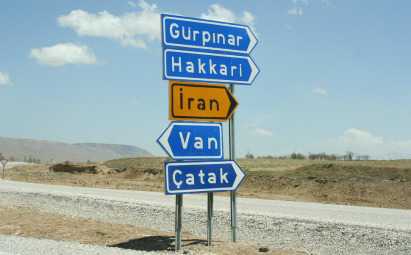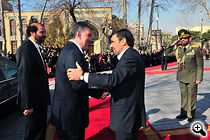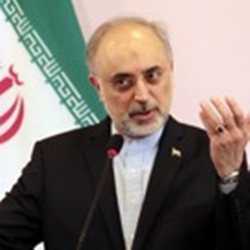The Regional Battle for Hearts and Minds

Near the Turkey-Iran border. (flickr/mr.beutel)
In a speech last August, Ayatollah Hashemi Shahroudi, who was Iran’s chief justice from 1999 to 2009 and is now a member of the Guardian Council, argued that “arrogant Western powers are afraid of regional countries’ relations with [Iran].” He went on to assert that, in their fear, those same powers were backing “innovative models of Islam, such as liberal Islam in Turkey,” in order to “replace the true Islam” as practiced by Iran.
Leaving aside his conspiratorial tone, recent developments in the Middle East have somewhat confirmed Shahroudi’s concerns. The Arab Spring has heightened the ideological tension between Ankara and Tehran, and Turkey’s model seems to be winning. Last spring, Iran often claimed that the Arab revolutions were akin to the Iranian one decades before and would usher in similar governments. Yet in Tunisia and Egypt, for the first time, leading figures in mainstream Islamist parties have won elections by explicitly appealing to the “the Turkish model” rather than to an Iranian-style theocracy. What’s more, in December 2011, the Palestinian movement Hamas salted the wound when a spokesman announced the organization’s shift toward “a policy of nonviolent resistance,” which reflected its decision to distance itself from Syria and Iran and to move closer to Egypt, Turkey, and Qatar.
The clash between Turkey and Iran has been more than just rhetorical. Tehran has been Syrian President Bashar al-Assad’s biggest supporter, whereas Ankara has come to condemn the regime’s “barbarism” and put its weight behind the opposition, hosting the Syrian National Council and the Free Syrian Army, the rebel government and army in exile. In Iraq, Iran is a patron of the Shias; Turkey is, at least in the eyes of many in the Middle East, the political and economic benefactor of the Sunnis and the Kurds. And the two countries have had tensions over the missile shield that NATO deployed in Turkey in September 2011. The Turkish government insists that the missile shield was not developed as a protection against Iran. Nevertheless, in December, an Iranian political official warned that his country would attack Turkey if the United States or Israel attacked Iran.
Although it would be wrong to say that Turkish policy has Islamist overtones, it certainly does have Muslim overtones.
The falling-out between Iran and Turkey discredits those political commentators in the West who, since the Justice and Development Party (AKP) rose to power in Turkey in 2002, have lamented Turkey’s shift from the West to the East. After Turkey brokered a nuclear fuel swap deal with Iran and Brazil in May 2010, the West appeared even more concerned. Dozens of columns, including one in The New York Times by Thomas Friedman, a columnist for the paper, decried Turkey’s new outlook as “shameful.” And when Turkey voted against new sanctions on Iran at the UN Security Council a month later, Con Coughlin, the executive foreign editor of The Telegraph, saw it as a sign of an emerging and dangerous Turkish-Iranian alliance, asking “Does Turkey really want to be the country responsible for launching a war between Iran and the West?”
In fact, over the past decade, Turkey’s foreign policy has been nothing so simple as a crude choice between East and West, or between Iran and the United States. Instead, Turkey’s foreign minister, Ahmet Davutoglu, has pursued a third way, by strengthening Turkey’s economic and political ties to all of its neighbors. In doing so, he has attempted to walk between the region’s “radicals,” such as President Mahmoud Ahmadinejad of Iran, and its “moderates,” such as former President Hosni Mubarak of Egypt.
The West, of course, preferred the moderates, but often failed to see that empowering them only spurred on the radicals. The West’s favorite Arab rulers, such as Mubarak and Zine el-Abidine Ben Ali, the former president of Tunisia, received praise for being not just moderate but also secular, but were brutal and corrupt dictators who lacked legitimacy in the eyes of their people. They were not elected, and, since they often appeared to be Western puppets, they actually served the agenda of the radicals, who looked genuine and noble in comparison.
The AKP’s third way stakes its claim to moderation and modernism not on good relations with the West (although it tries to keep on decent terms) but on its democratic system and its pragmatism. Although the cadre at the top of the party is generally pious, it has not imposed sharia rule in Turkey, as some secularist Turks have feared, and has not geared its foreign policy toward spreading Islamism. Instead, it has focused on soft power and economic interests. For example, although Islamist parties often call for an “Islamic economy,” free of interest, the AKP has chosen to integrate into the global economy and follow fairly liberal economic policy. The government has avoided any actions that would dampen trade and investment, striving to have “zero problems with neighbors.”
Further evidence of Turkey’s pragmatism can be seen in its behavior toward Iraqi Kurdistan, a region that the country’s former secular establishment used to see as a lethal threat because of its fears that Turkey’s own Kurds could agitate to form a Greater Unified Kurdistan with Kurds in Iraq. The AKP has viewed the region more as a zone of economic opportunity. In the past decade, Turkish companies flooded Iraqi Kurdistan, and the Turkish government gradually befriended Iraqi Kurds. In 2011, Prime Minister Recep Tayyip Erdogan opened a Turkish-built international airport and a government consulate in Arbil, the Kurdish capital. Radicals and would probably have wanted to destabilize Iraq, in order to stress American loss.
However, although it would be wrong to say that Turkish policy has Islamist overtones, it certainly does have Muslim overtones. Ankara cares about what happens in Egypt, Gaza, and Tunisia partly because people there have deep religious and historical ties to Turkey. Even then, the AKP has tried to be as pragmatic as possible, and generally avoided taking sides in sectarian splits in the Gulf, Lebanon, Syria, and especially in Iraq. “I am neither a Shiite nor a Sunni; I am a Muslim,” Erdogan said in his July 2008 visit to Iraq. Accordingly, in March 2011, he visited Iraq’s Shia shrines — apparently a first for a Sunni statesman — and even the modest residence of the Grand Ayatollah Ali Sistani, the spiritual leader of Iraq’s Shia community. To put it differently, Iran envisions itself as the patron of the Shia and Saudi Arabia sees itself as the patron of the Sunnis, but Turkey has tried to engage with both of these camps — and with the Christians and the secular, besides.
Yet the realities of the region challenge Turkey’s mix of pragmatism and ecumenical idealism. First, for now, the country has not been able to bridge the gap between Iran and the West on the nuclear issue. Second, despite its attempts to avoid being perceived as a Sunni power, it has failed to build lasting ties with Shia in the region, who look up to Tehran rather than Ankara. In Iraq, Prime Minister Nouri al-Maliki, a Shiite and an ally of Iran, repeatedly spoke against “Turkish interference” in the politics of Baghdad. And in Syria, where Assad’s Alawi regime is violently oppressing a Sunni majority, the dichotomy became even clearer: Turkey stands on the side of the opposition, whose dominant component is the Sunni community, including the Syrian Muslim Brotherhood.
Despite these problems, and its shortcomings at home, Turkey is still a source of inspiration for the region, particularly for Islamist parties that want to participate in democratic politics and form governments that will deliver to their people. This is because the AKP’s third way, while having clear Muslim cultural tones, also enshrines values that are more universal: democracy, human rights, and the market economy. The way Erdogan defines these concepts is not as liberal as the West might like — especially when it comes to freedom of speech — but neither is it unhelpful. In a recent survey, TESEV, a liberal Turkish think tank, found that the majority of Arabs see Turkey as “a model country,” because “it is at once Muslim, democratic, open, and prosperous.”
Understanding the value of these aspects of his country’s policies, Erdogan has placed more emphasis on them since the beginning of the Arab Spring. In visits to Egypt, Tunisia, and Libya last year, to the surprise of some Arab Islamists, he defended the secular state as a state “at an equal distance to all religious groups, including Muslim, Christian, Jewish, and atheist people.” And last week, Turkish President Abdullah Gül, reaffirmed the sentiment in a visit to Tunisia. In his address to the Tunisian parliament, he emphasized the need for a regional synthesis of Islam and “democracy, the market economy and modernity.”
Meanwhile, in Syria, Ankara has taken a stand against the Assad regime, with which Turkey had developed a good and profitable relationship before the Arab Spring. Through close cooperation with the Obama administration on the Syrian matter, Erdogan has also shown that a pious and independent Muslim leader can work with the West on common goals. And finally, within Turkey, Erdogan’s AKP has demonstrated that a political movement inspired by Islamic values need not impose those values.
So, the Iranians seem right to be concerned about “liberal Islam in Turkey” and its appeal in the region. To be sure, Iran’s own destiny is a matter that Turkey cannot affect. However, the Islamic Republic’s regional influence, which sprang from its image as an Islamic hero in a world of Western puppets, is now overshadowed by that of AKP-led Turkey. And for all those who wish to see a more peaceful, democratic, and free Middle East, this should be good news.




